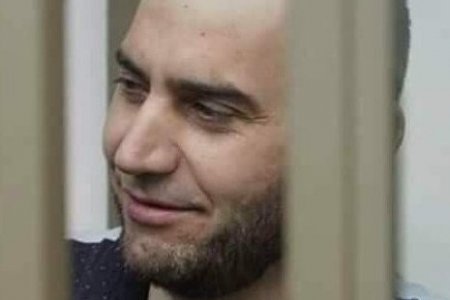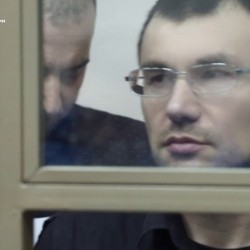
Not content with its brutal persecution of Ukrainian political prisoner Vadim Siruk, Crimean occupation ‘officers’ have now targeted Vadim’s wife, Anna Bogacheva and, through her, the couple’s two small daughters.
On 3 April 2025, ‘major’ Kuzma Konosov and two colleagues in plain clothes, who did not identify themselves, turned up at the family’s home in an ordinary car without any police marking. They walked in without knocking, having forced Siruk’s brother to accompany them and open the front door for them.
The men clearly had no warrant with them, but since they tried to walk through the house, she was forced to go out into the courtyard with them. Konosov proceeded to grill her about her husband, about her contact with him and the length of Vadim’s sentence, which he undoubtedly knew. He then demanded to know who she was living with and asked if she knew about the arson attack on the grave of Alexander Fedorchak, the so-called military correspondent for the Russian propaganda media Izvestia. If this was the pretext for the ‘officers’’ visitation, it was an evidently absurd one. The grave may have been at the local cemetery, but there was no reason whatsoever to suspect a young mother, forced to be bringing up two children by herself, of involvement.
Anna explained to Crimean Solidarity that she had immediately sent a message to friends warning them that the police had arrived. This is what Russian occupation has led to, with the young Ukrainian needing to be sure that friends would come and care for her two daughters should she be arrested. She also informed Konosov of this. He demanded that she come with them, brining her phone and not deleting anything from it. He was clearly annoyed when she responded by stating that she had informed both friends and her lawyer, and demanded to know what Messenger platforms she uses, as well as threatening to take her phone away. She refused to answer any questions without her lawyer and suggested that they deliver a summons if they have questions to her. Kornosov then began threatening that if she didn’t “cooperate”, that they would return with a search warrant and would “arrange things so that I couldn’t drive anymore or live in this district”.
Typically, Konosov also wanted to know if she was in contact with organizations like Crimean Solidarity. This vital Crimean Tatar human rights movement arose in response to the mounting repression under Russian occupation, with the trigger being the particularly savage ‘operation’ on 11 February 2016, terrorizing several families with small children and resulting in the areas of Crimean Tatar human rights activist Emir-Usein Kuku, Muslim Aliev; Inver Bekirov and Vadim Siruk. Both Siruk and Bogacheva are ethnic Ukrainian converts to Islam, with it suspected that this was, in fact, the reason why Siruk was targeted. Konosov claimed that, since Anna Bogacheva was “now a Muslim”, she must have been “recruited by extremist groups”.
This would appear to have been an act of intimidation, with the ‘police’ leaving, once Bogacheva stood her ground. It remains to be seen whether they return.
Vadim Siruk and Russian terror under international scrutiny
Although Russia’s ‘operation’ on 11 February 2016 was the second round of politically motivated arrests of Crimean Tatar and other Muslims in occupied Crimea, the earlier arrests had received very little attention. It was largely because of the FSB’s evident attack on Emir-Usein Kuku (b. 1976), the son of a veteran of the Crimean Tatar national movement and human rights activist, monitoring Russia’s enforced disappearances and repression, which changed that. He had already faced harassment and persecution in April, then in December 2015. The events in April 2015 may well have been planned as an enforced disappearance, which only ‘turned into an FSB operation’ only after Kuku’s cries for help led to a crowd gathering. In fact, all of the men arrested either that day or on 18 April 2016 were victims of political persecution. Muslim Aliev (b. 1971 was targeted for his religious ‘dissidence’, as have been others from his ‘Alushta’ Muslim community, as well as for his civic position. The escalation in the charges against Inver Bekirov (b. 1963); and the arrest of his 25-year-old nephew, Refat Alimov (b. 1991), were almost certainly due to Bekirov’s refusal to collaborate with the FSB, as was the harassment over months and then the arrest of 25-year-old Arsen Dzhepparov (b. 1991) Vadim Siruk (b. 20.02.1989) may well have been targeted as a warning to other converts to Islam of the dangers they could face, as well as because of his firm civic position.
All of the men were soon recognized by Memorial as political prisoners and as Amnesty International prisoners of conscience.
In all such cases, which the Memorial Human Rights Centre condemned as ‘serial’, the men arrested are not accused of any actual crime, with the charges pertaining purely to unproven allegations of ‘involvement’ in Hizb ut-Tahrir. This is based solely on the flawed 2003 Russian supreme court ruling declaring the peaceful (if controversial) transnational Muslim organization, which is legal in Ukraine, ‘terrorist’. On the basis of that secretive and unexplained ruling, the FSB brings ‘terrorism’ charges, using FSB-loyal ‘experts’ to find spurious ‘proof’ of involvement in Hizb ut-Tahrir. In this case, they claimed to find it in an illicitly recorded conversation “in the kitchen” where the men were discussing the situation in Russia, Ukraine, the fate of Crimea, the place of Islam in both countries and various religious postulates.
These alleged expert assessments are supplemented by the supposed testimony of anonymous witnesses, with the court invariably blocking questions from the defence which would prove that the alleged witnesses do not even know the defendants or were lying
Muslim Aliev and Inver Bekirov were designated the role of ‘organizer’ of the so-called ‘Hizb ut-Tahrir cell’, under Article 205.5 § 1 of Russia’s criminal code, while the others were charged with ‘involvement’ under Article 205.5 § 2. All six men were later charged additionally with ‘planning violent seizure of power’ (Article 278).
On 12 November 2019, ‘judges’ Roman Viktorovich Saprunov; Dmitry Viktorovich Merkulov and Roman Vladimirovich Podolsky from the Southern District Military Court in Rostov handed down the six guilty verdicts required of them. These were, on 25 June 2020, upheld by Oleg Aleksandrovich Yegorov; Aleksander Aleksandrovich Mordovin and Anatoly Valentinovich Solin from the Vlasikha military court of appeal. Muslim Aliev and Inver Bekirov were sentenced to 19 years; Emir-Usein Kuku and Vadym Siruk – to 12 years; Refat Alimov to 8 years and Arsen Dzhepparov to seven years. Not one Ukrainian political prisoner has ever been released early, and both Refat and Arsen served their sentences to the last day, The sentences were for maximum-security (or ‘harsh-regime’) prison colonies, with prison administrations imposing even harsher conditions on Crimean Tatar and other Ukrainian political prisoners.
In Siruk’s final address to the court, he stated that “the real terrorists are those who burst into the homes of people peacefully sleeping, who intimidate people who tell the truth; those who have turned a resort peninsula into a military base, bringing in thousands of items of military technology; and those who persecute and imprison people for their political and religious views.”
Please write to Vadim Siruk; Emir-Usein Kuku; Muslim Aliev; and Inver Bekirov!
Letters are a lifeline to the men and send an important message to Moscow that its treatment of Ukrainian political prisoners is under scrutiny. Letters need to be in Russian, handwritten, and on ‘safe’ subjects. If that is a problem, use the sample letter below (copying it by hand), perhaps adding a picture or photo. Do add a return address so that the men can answer.
Sample letter
Привет,
Желаю Вам крепкого здоровья и надеюсь, Вы скоро вернетесь домой, к своим родным. Простите, что мало пишу – мне трудно писать по-русски, но мы все о Вас помним.
[Hi. I wish you good health and hope that you will soon be home, with your family. I’m sorry that this letter is short – it’s hard for me to write in Russian., but you are not forgotten. ]
Addresses (these can be in English or Russian, as below)
Vadim Siruk
453256, Россия, Республика Башкортостан, г. Салават, станция Южный, ФКУ ИК-2
Сируку, Вадиму Андреевичу, 1989 г.р.
[In English: Russian Federation, 453256, Bashkortostan, Salavat, Stantsiya Yuzhny, Prison No. 2
Siruk, Vadim Andreevich, b. 1989 ]
Muslim Aliev
453256, Россия, Республика Башкортостан, г. Салават, станция Южный, ФКУ ИК-2
Алиеву, Муслиму Нуриевичу, 1971 г.р.
[In English: Russian Federation, 453256, Bashkortostan, Salavat, Stantsiya Yuzhny, Prison No. 2
Aliev, Muslim Nurievich, b. 1971 ]
Inver Bekirov
453256, Россия, Республика Башкортостан, г. Салават, станция Южный, ФКУ ИК-2
Бекирову, Инверу Небиевичу, 1963 г.р
[In English: Russian Federation, 453256, Bashkortostan, Salavat, Stantsiya Yuzhny, Prison No. 2
Bekirov, Inver Nebiyevich, b. 1963 ]
Emir-Usein Kuku
453256, Россия, Республика Башкортостан, г. Салават, ФКУ ИК-16
Куку, Эмиру-Усеину Кемаловичу, 1976 г.р.
[In English: Russian Federation, 453256, Bashkortostan, Salavat, Prison No. 16
Kuku, Emir-Usein Kemalovich, b. 1976 ]



